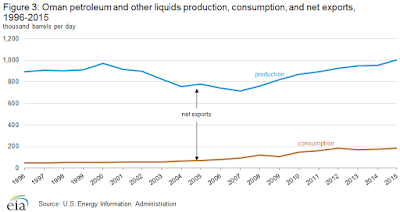The Sultanate of Oman, a rather humble and somewhat stealth tiny state in the Persian (Arabic) Gulf, is setting its own path in the regional dynamics, and it has a positive outlook so far, based mainly on its important oil and gas production growth, just about recently, in the last 2 years, averaging 1 million barrels per day, jumping from previous levels of 650 thousand barrels per day in 2007-2008 approximately. And this has been prompted by a relatively more stable landscape and internal political, economic and socio-religious environment to receive foreign investments, comparatively speaking to the rest of the countries in the Gulf hit hard by the low oil prices, even if now Oman also has been feeling the consequences of this situation, according to many regional information sources on this issue.
In this sense, Oman has been an important exporter of oil to asian markets, where according to the Energy Information Administration latest data, only China by itself accounted for the 70% of omani crude exports, making it its main partner on this field, and also India and Iran represent important clients in this regard. Also, Oman has an important role as gas producer in a region where natural gas only has Qatar as the champion as top reservoir and production. All the previous items have allowed the Sultan Qaboos to project Oman in a considerable and positive way in the decision making process and the regional geopolitics, by participating for example in the recent talks between United States, the EU, Russia and Iran over the nuclear deal, even this participation went somewhat unnoticed. Also, Oman all of a sudden has been called repeatedly by OPEC to participate in their previous meetings based on its exponential production growth and hence giving it more international exposure, where Oman has offered to cooperate actively over the stabilization of markets and prices, offering to cut production sometimes, but with no result whatsoever. But certainly, all this has given Oman a great opportunity to assume a role similar of that assumed before by other tiny states like Qatar, the UAE, with important and outstanding achievements so far.
Now with Iran ascendant in the regional arena and with a sectarian strife against Saudi Arabia scattering all across the MENA and the islamic world, where many countries have experienced clashes between sunnis and shias proxies in Bahrein, Lebanon, Iraq, Yemen, and with no end in sight, Oman certainly has all the positive outlook and seems like an oasis in the middle of the growing and continuing instability in the region, with few political and social risks being one of the most important and crucial the issue of succession since it has been known about the illness of current ruler Sultan Qaboos and all the speculations about who would be his immediate replacement, which could create a vacuum of power and be leveraged by outside powers to expand influence in the country. Even if Oman has not been suffering from the current sectarian strife so far, it has been suspected Iran has been strongly supporting Oman and even signed recently after sanctions were lifted, a deal on LNG supplies to Oman from Iran, being one of the first ones signed by iranian authorities so far.
So Oman's future intentions and goals based on what it has been doing and carrying out so far will much depend on its political future, the status of its economy and how it will weather out the low oil prices environment and how it will leverage also to develop a "post oil" plan for the coming years, how it will have success to manage the regional dynamics of power and the tremendous shifting alliances, the future of Saudi Arabia, one of its neighbors and its relationship with Iran and important also for its future, how it will handle its relationship with outside powers like China, the U.S, and Russia, with growing ambitions in the Middle East.


